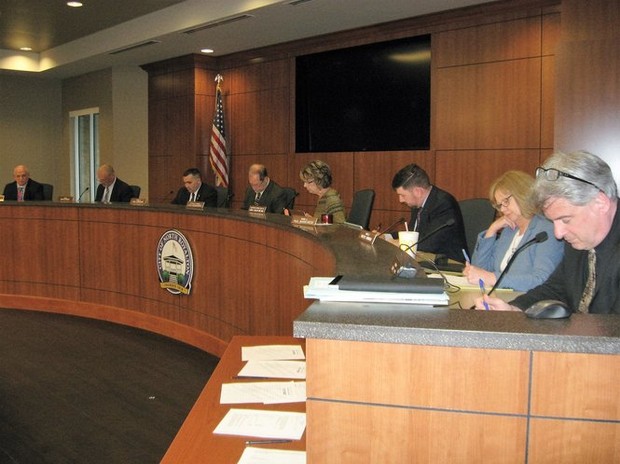NORTH ROYALTON, Ohio – An ordinance that would permanently ban the growing, processing and selling of medical marijuana in town has been placed on hold by City Council.
Meanwhile, council has extended a medical-marijuana moratorium – which had expired Sept. 6 – by six months. The moratorium, which temporarily bans the cultivating and and selling of medical marijuana, would end in March 2018, unless council extends it again. The moratorium was first established in September 2016.
Council referred the permanent medical-marijuana ban to its Safety Committee for further discussion. The committee’s next meeting is scheduled for Oct. 17.
North Royalton is one of several Ohio communities – including Brecksville, Broadview Heights and Strongsville – that have established moratoriums on medical marijuana. The idea was to give city officials time to study a new state law, House Bill 523, that allows patients to use medical marijuana prescribed by doctors.
HB 523 authorizes municipal governments to restrict locations where marijuana is cultivated, processed and sold, or even ban the growing and sales of medical marijuana altogether. However, municipalities cannot stop residents from using medical marijuana purchased in other communities.
Meanwhile, according to North Royalton Mayor Robert Stefanik, other Greater Cleveland communities – including Cleveland, Parma, Euclid, South Euclid and Macedonia – have decided to permit the growing, processing and selling of medical marijuana within their borders.
“Even if we wanted to do it, we missed the boat, because other cities are already doing it,” Stefanik told council last week.
Federal vs. state
On Sept. 5, North Royalton police patrolman Jon Karl, resource officer for North Royalton City Schools, volunteered to act as council’s “technical adviser” regarding medical marijuana. He said he has served on the Cuyahoga County Opiate Task Force.
“I would have grave concerns that our community would be able to support (medical marijuana),” Karl told council. “It seems well beyond our means at the time.”
Karl said that about eight years ago, the state mandated the formation of a Family and Civic Engagement Committee in each school district. The committees were asked to identify shortcomings and gaps in education.
Karl said the level of marijuana’s active ingredient, THC, has risen over the years, from 3 percent-5 percent to 30 percent-40 percent. Edible marijuana now coming into Ohio has a 60 percent-70 percent THC level.
“The drug we have out there today is a drug we don’t know anything about,” Karl said.
Councilman Larry Antoskiewicz said Karl’s concerns were beside the point. He said the state has allowed the use of medical marijuana in all communities, even if residents must buy the drug in another town. He said North Royalton must decide whether to allow cultivators and sellers here.
Councilman Dan Langshaw, who sponsored the ordinance that would establish a permanent ban, said HB 523 conflicts with federal law, which prohibits the growing and selling of marijuana.
“I cannot support violating federal law,” Langshaw said.
Councilman Dan Kasaris agreed, saying that federal law lists marijuana in the same category as PCP and heroin, which are also illegal. He supported banning the cultivating and selling of marijuana in North Royalton.Regarding federal law, Councilman John Nickell, countering Langshaw’s position, said the U.S. Constitution allows for states’ rights.
Councilwoman Cheryl Hannan added that 28 states allow the use of medical marijuana, and that the federal government has stated more than once that it would not interfere with those states. She said doctors, not the government, should decide whether to prescribe marijuana to a patient.
Law Director Tom Kelly told council that whatever it decides, the ordinance might later be tested in court. He advised council to make sure it has good reasons for each stipulation in the ordinance.
Messing with moratoriums
On Sept. 19, Councilman Gary Petrusky said council should extend the medical-marijuana moratorium – which by that time had expired – instead of voting on the permanent ban. He said the moratorium would give the city more time to see how the state’s medical-marijuana program will pan out.
State regulators have set a November target date for awarding medical-marijuana-cultivation licenses. In June, the Ohio Department of Commerce received 185 applications for 24 cultivator licenses throughout the state. However, the commerce department didn’t say in which communities applicants would operate.
However, Stefanik said it’s unlikely that a marijuana cultivator or seller would want to set up shop in North Royalton. He said “quite a few” marijuana operators initially contacted him about locating here but they quickly abandoned that idea when they learned of the city’s moratorium.
“They don’t want to mess around with cities that have a moratorium or that have outlawed (medical marijuana) completely,” Stefanik said.
Kasaris said he favored the medical-marijuana ban but voted to extend the moratorium out of courtesy to Petrusky.
Only Langshaw, sponsor of the marijuana-ban ordinance, voted against the moratorium extension.
credit:cleveland.com


